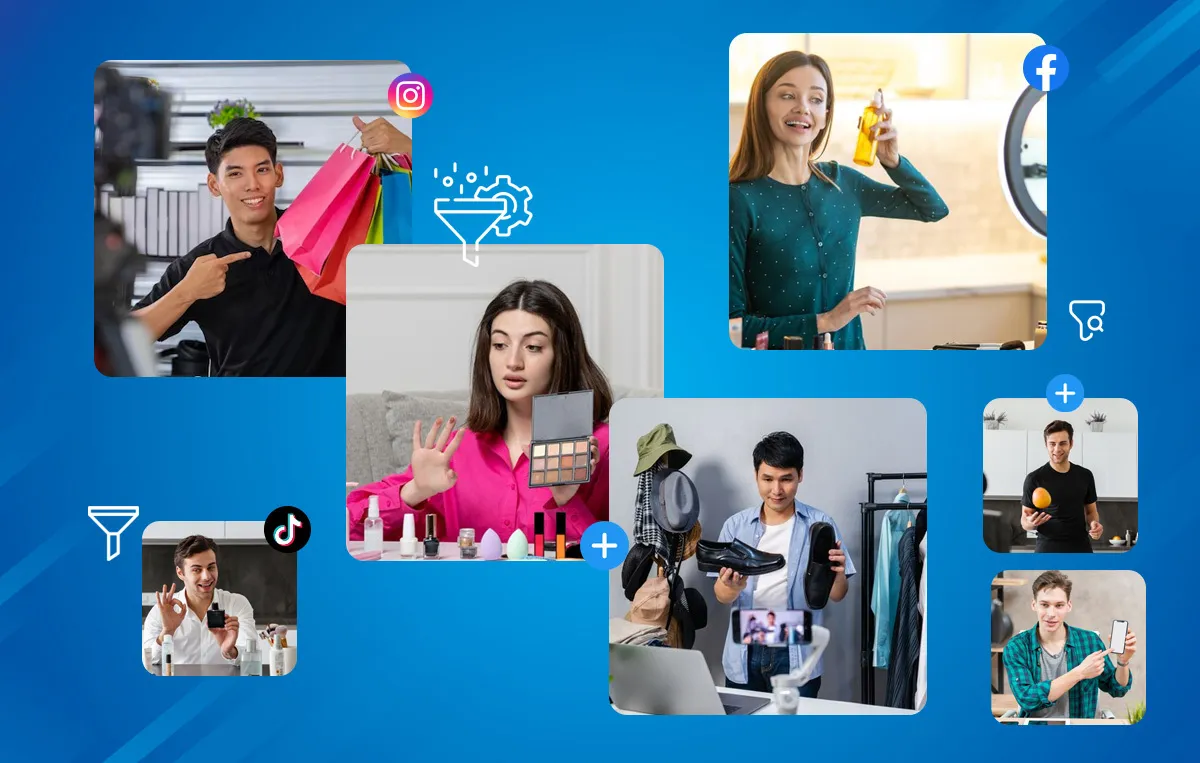Influencer marketing seems to have become the holy grail for achieving social media success of brands. According to marketers, influencer-generated content earns 8x more engagement than sophisticated branded content. So, it’s a proven fact that everybody loves them.
Not only the audience but brands also favor them, given the fact that every $1 spent on influencers generates $5 to $6.50 in revenue.
However, marketers are lost in the selection process because they don’t know how to find influencers on social media who would be a perfect fit.
In this article, we will tell you how to crack the code and find influencers for your brand. But first, let’s understand what an influencer is.
Who Is an Influencer
To define the term simply, an influencer is a known content creator who has the power to affect the buying decisions of their audience. This person is believed to have certain expertise in a certain niche but is a relatable personality that the audience finds more approachable.
Social media influencers actively seek interaction with their audience. They regularly create content on social media around topics in hopes of providing value for their audience.
Over time, they gather a dedicated fan base who avidly follow and engage with each of their posts.
However, not every content creator is an influencer, but they can become one if they gain an ample amount of audience.
How Are Influencers Helpful in Marketing Your Brand
Now, how can brands NOT WANT a person to market them who has the attention of a large audience?
But of course they do.
If you know just how to find influencers to promote your product, they hold enough sway on the buying decision of the audience. The trust that they have built among their followers comes in handy for marketers to boost their product’s branding.
It is a tried and tested trick for marketing to be using famous people to familiarize their brand among the masses. However, doing this with influencers takes your reach to the grassroot level. They prove to be more effective due to their relatable public images.
The regular posting and engagement that influencers have access to can help create top of the mind recall for their followers, who also happen to be your target audience.
One last thing we want to highlight is that influencers you collaborate with, if you know how to find influencers for your brand, often turn out to be a part of your audience as well. So them making content on your product technically is UGC. And everyone knows that user-generated content is way more believable than any branded one.
Numerous compelling reasons exist to underscore why influencers can wield remarkable effectiveness in your marketing endeavors. However, the alignment of niches of the business and the influencer is way more important than the size of the influencer’s following.
Before getting into the subject of how to find influencers, lets get to know a little more about them.
Types of Influencers To Choose From
The task of how to find social media influencers for your brand can be daunting when there is such an abundance of them online.
However, you can segregate them into categories based on their platforms, number of followers, and niche.
Influencers can be widely classified into 4 broad categories, loosely on the basis of their domain authority and follower count.
Micro-Influencers
Number of followers: 1000-100,000
This type of influencer lies on the lowest wrung of the ladder, is lesser known by the masses, and has small but tight-knit communities which makes micro-influencers a popular choice among some brands. They work with very niche-specific topics, having an in-depth understanding of the industry, which has earned them authority among their followers.
As the whole idea might suggest, these micro-influencers work at more affordable prices than their well-known counterparts. And they are way closer to their community as being relatable gives them much more traction among them.
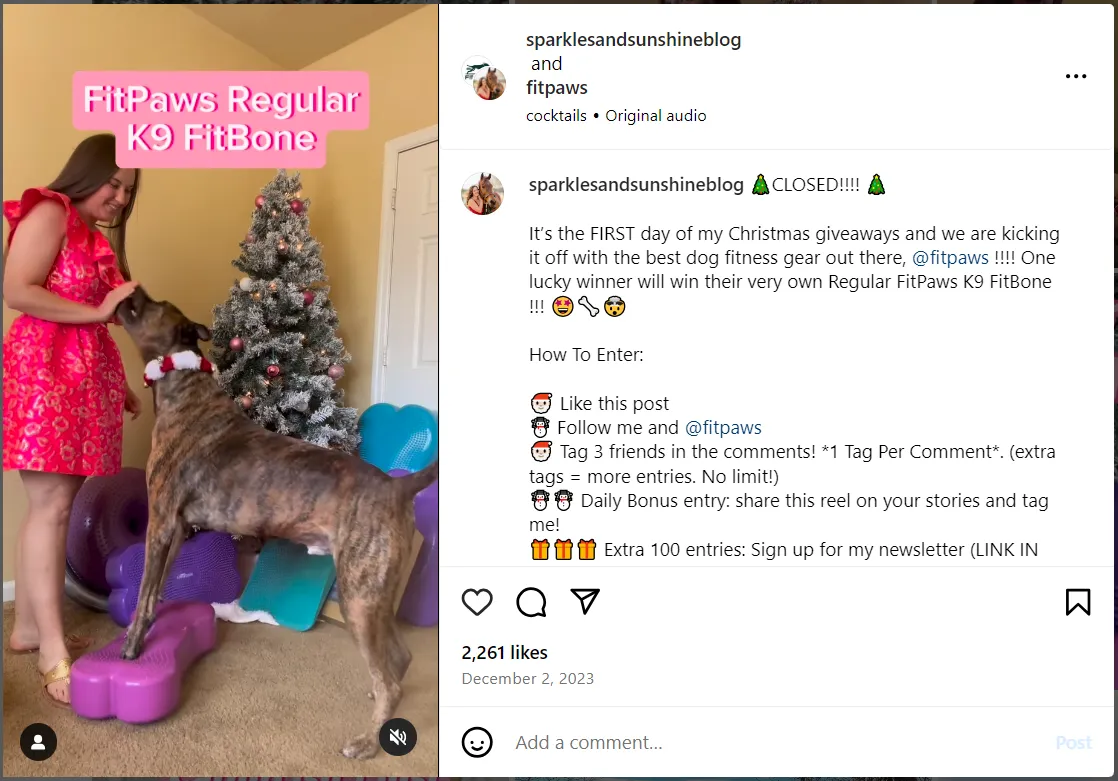
Caitlin is a good example of a micro-influencer who runs her Instagram page on animal enrichment. She gets regular engagement from pet-owners. This is a collaboration post she has posted with a brand for toys for pets.
Mid-Tier Influencers
Number of followers: 100,000-500,000
These social media influencers have established a considerable amount of followers. They have more polished content than micro-influencers and, having worked with more brands, bring a more professional approach to the table.
Below is the Instagram page of food vlogger Kiley O’Donnell who has around 280k followers. This is a paid post in collaboration with a protein supplement brand Ritual. She has very smartly incorporated the product into one of her smoothie recipes.
Take a look at the comment section, where the personal and easy nature of the conversation she has with her followers is very apparent.
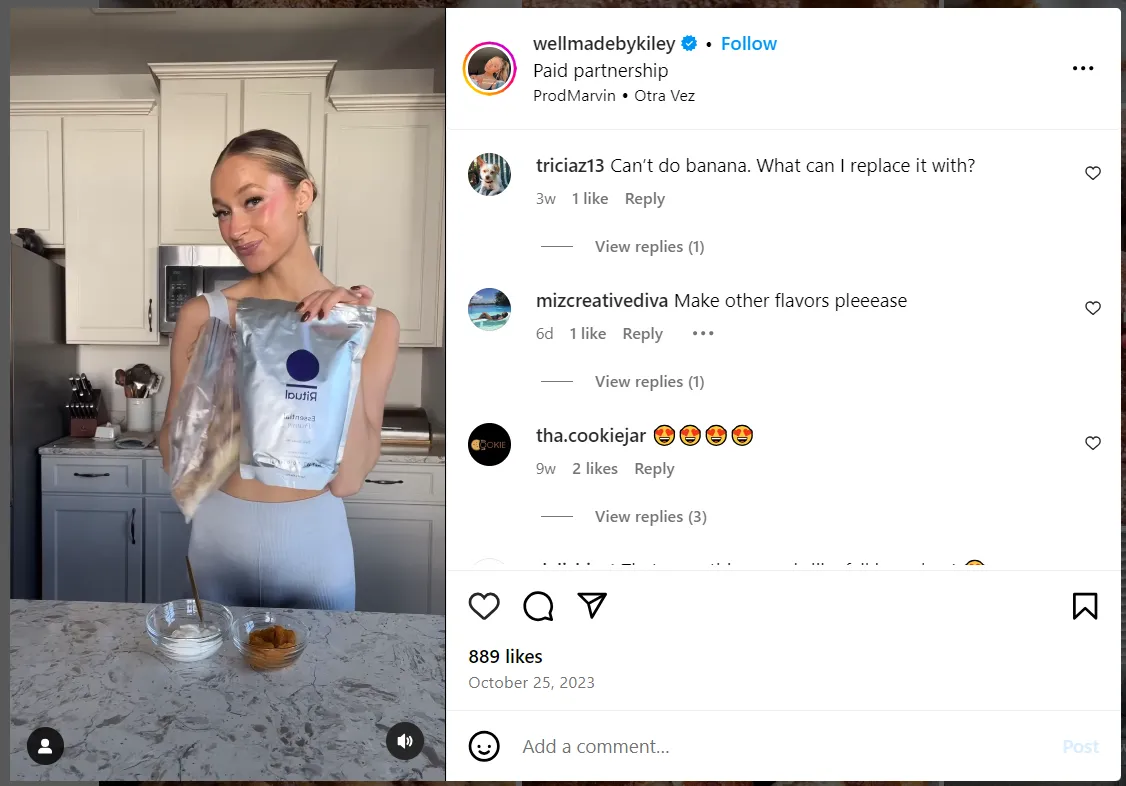
This is the category that medium to small businesses demand the most. Their contact with a niche audience is more spread-out reach in the industry makes them perfect for spreading brand awareness.
Macro-Influencers
Number of followers: 500,000- 1 million
They are the heavy-weights in the world of social media influencers, having worked with multiple well-known brands or created their business online. Their content might not be as niche-specific as the previous two categories, but be sure to have heard of them even if you operate in different industries.
Macro-influencers not only serve a larger demographic but also create content of different types, starting from educational, promotional, and entertaining.
Joanne Molinaro, aka The Korean Vegan, falls in this category with around 760k followers. She started by making vegan versions of Korean recipes with the voiceover of inspirational and personal life stories. Now she has grown to have a published book of her own.
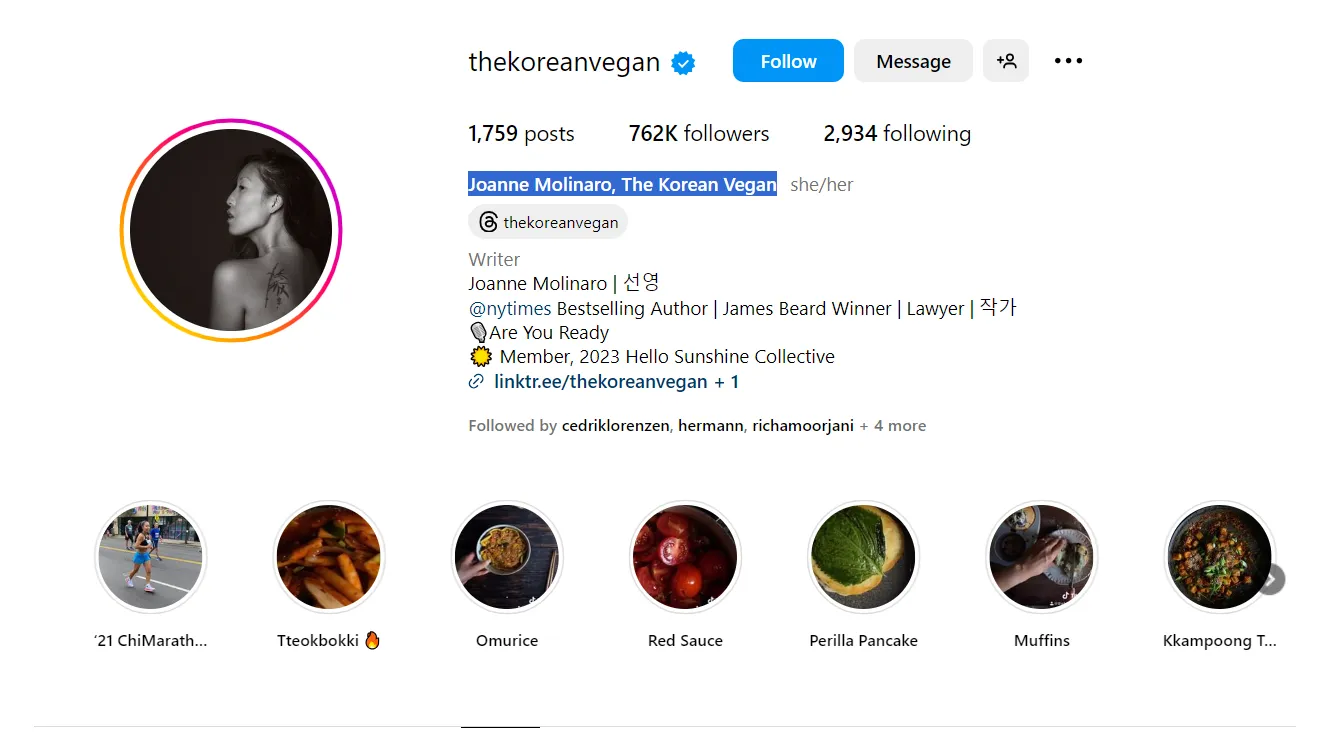
Basically, they are small-scale celebrities and have an audience who not only follow their content but also are interested in their lives. Branding and recognition are the prerogatives you will get by associating with macro-influencers.
Mega-Influencers
Number of followers: 1 million +
These people are actual celebrities more than they are influencers, having gained their fame from social media content and other media sources. They are household names with dedicated followers, but their celebrity status did not originate from their social media content alone.
Their influence holds such power that they don’t really need to promote any product or service actively. Them being seen using a product or mentioning it in passing is marketing enough to get sold off the racks and out of stock.
Everyone knows about the incident when Cristiano Ronaldo put aside a bottle of well-known soft drinks to prefer water in its place. The repercussions were nothing short of astonishing.
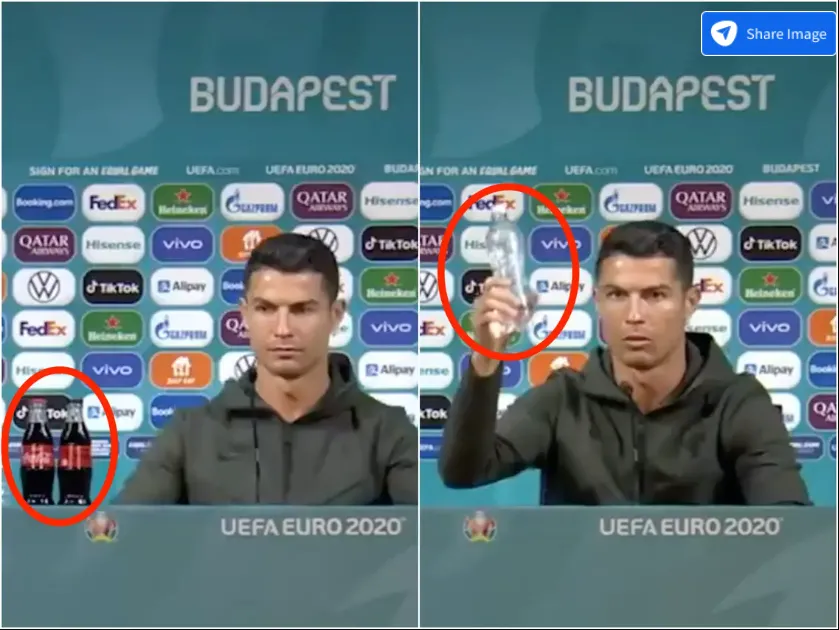
Remember, these mega influencers are great for boosting brand visibility, but niche-specific expertise and authority are something they can’t build. They are not really connected to their audience personally.
This was just the segregation on numbers to help you in the process of how to find social media influencers. But there are other points to consider.
Factors to Weigh In While Deciding on Your Perfect Influencer
Many brands make the mistake of assuming that the influencer with more followers can help them achieve their goals.
This is when they don’t know how to find influencers for their brands. Let me tell you, along with the size of your business, it is imperative that you look at your campaign goals. These are some of the possible targets your business could fulfill with influencer campaigns:
- Spreading brand awareness
- Boost in app downloads
- Increased engagement
- Providing social proof
- Reach specific target audience
If your choice of influencer does not align with the objective you are aiming for, how could you aim true?
For a product like SocialPilot, which is a social media management tool, we had figured out that branding and awareness were the prime goals we wanted to target with influencer marketing.
So we went after an influencer whose niche is completely aligned to ours despite them being a micro-influencer. Their clientele includes agencies and people who would benefit from our product.
After they posted about SocialPilot, the curiosity and buzz we wanted was successfully generated.
Just look at the comment section, you will know what I’m talking about.
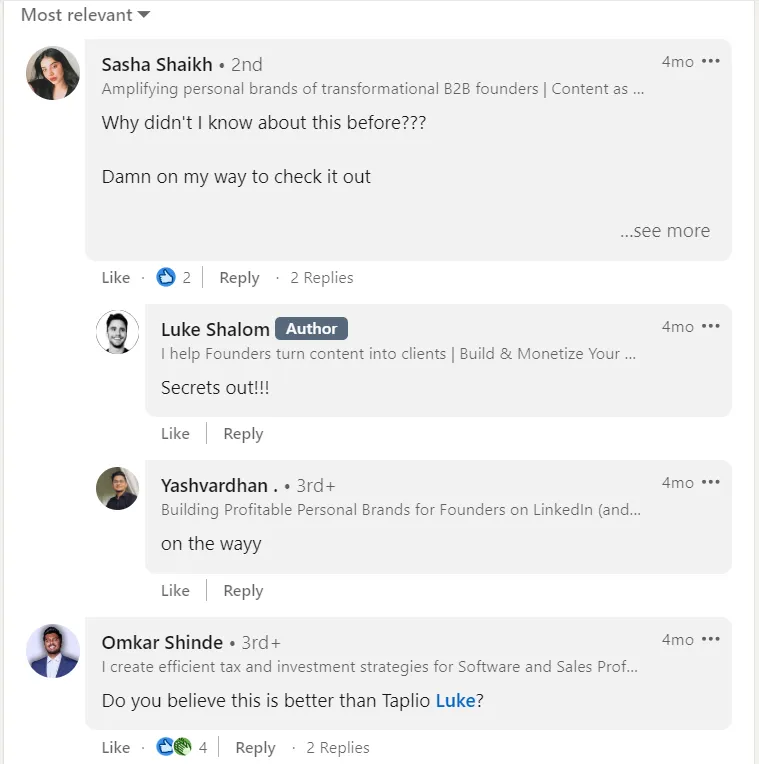
The key is to ask the right questions.
You have to find the objectives that you want to achieve from the influencer marketing campaign. Only then can you ask how to find influencers to promote your business.
Now, whilst you search, keeping certain filters to shortlist from the plethora of influencers you will come across is absolutely necessary. I’ve tried to list all of them so you are well-equipped before starting your search.
Target Audience
This is one of the most basic but important factors that is in the forefront of your selection. The influencer you are looking at should have a follower base embedded in the demographics of your target audience or vice versa.
To manually check the influencer’s target audience, you can analyze their content type, the channels they are active and engaged on, and lastly, the incoming comments.
This is especially important for businesses that are looking to operate on niche markets.
Platforms They’re Active On
Now the alignment of social media channels the brand and the influencer are active on is another major factor. If you as a brand want to market your product on a specific platform, you obviously will peruse the influencers who have a strong presence on that same platform.
Albeit its possible that you want to promote your brand on more than one platform. If you think of hiring a different influencer for each of these platforms, that is not recommended.
And the hassle of managing multiple such ventures with limited resources is just not worth it. Hence focus on the platform on which your target audience resides.
Number of Followers
This is the metric that is often the answer of how to find influencers for most brands. Little do they know, this is just one of the many things that they have to measure.
Based on the number of followers, influencers have been grouped into categories and named accordingly. However, higher numbers often lead to influencers charging more and having multiple brands in the works at once.
Engagement Rate
The engagement rate is very crucial when going after some of the marketing objectives. While many marketers depend on reach and impressions for making the decision, engagement is what reveals the true impact of a campaign.
While mega and macro influencers have excellent reach, the engagement and comment section presents quite a different picture. Engagement metrics such as shares, saves, reposts, and comments can bring quality leads like no other.
There have been a lot of occasions in our influencer marketing venture when the follower count influencers have left us bedazzled but engagement, not so much. On the other hand, if you dive a little deeper, niche micro-influencers with tight-knit communities have actual productive interactions with their followers.
This results in evoking actual interest in them about your product which is a lot than just grabbing eyeballs.
Type of Content
The values of an influencer are reflected in the content they create. These values should align with that of your brand. If the type of content they promote does not align with your own brand image, then the collaboration seems fake and proves to be ineffective in the public eye.
You have to look at the past successful campaign of the influencer, their vision and the ideas they have promoted. Loss of trust from the audience due to diversion from one’s brand values can hamper both you and the influencer in the process.
(alignment with the brand, previous successful campaigns)
Influencer Fees
This is one of the major factors that proves to be a restriction for medium to small brands. It often happens that you want an influencer who is perfect for your brand and campaign vision in every way but they turn out to be unaffordable.
The solution to this dilemma is why micro-influencers have risen up to take over the influencer marketing scene. Industry-specific small-scale influencers have proven to be very effective while charging reasonably.
And they are more open to negotiations.
Regularity
Regularly posting on social media is one of the key identifying features of an influencer. Regular visibility helps them establish a sense of dependability in the eyes of their audience.
Hence it’s better to pair up with an influencer who posts regularly and does not take a hiatus every now and then.
Authenticity
Influencers have to work to make people believe that they are authentic and trustworthy in the eyes of their audience. However, when they start to associate with brands, they publish promotional content more and more. Sometimes, bit too often.
People recognise this and distrust and influencer fatigue builds up in their minds, leading to a loss of authenticity.
Hence be sure to look at the history of the content pattern of the influencer you have in mind.
Now that we have gone through the checklist, we have come to the meat of the matter. Let’s go through all the ways to find influencers for your brand.
How to Find the Best Social Media Influencers for Your Brand
Influencers are in abundance all over the place. Finding them is not that big of an issue. But finding a suitable one is the main task. Here are some of the avenues you can use to find those options which could actually rev up your brand’s image in the public eye.
Social Media is Your Biggest Friend
This is the hotbed where it all happens. You can find all that you are looking for on social media. Employ listening tools or search manually to peruse relevant topics that make sense in reference to your brand and your campaign goals.
Social media algorithms have become smart enough that they will start suggesting profiles related to the topics of your interest on your own, which could lead up to some pretty good prospects organically.
And if you have business pages that you probably do, go through your followers list. Alas, niche influencers are normal people who make useful content themselves to have developed a dedicated fan-base of their own.
If they already are following you, making a deal with them would become even more easier.
Use Trending Hashtags
If you are on social media, hunting with hashtags makes a lot of sense. Influencers tend to use a lot of hashtags in their posts to boost their reach and impressions. So keep up with all the relevant happenings and search for the trending hashtags in your industry to see which again might bring you to some interesting profiles.
You can monitor the performance of your most used and relevant hashtags by going through the profiles that use the same or similar hashtags for their posts.
Brand Mentions
Finding influencers who have mentioned your brand on their own is like being served a great deal on a fine platter. You no longer need to know how to find influencers on social media, they are doing that on their own.
These influencers are from relevant industries, thats for sure. Now all you have to do is reach back out to them and offer them a sweet deal. The probability is that they would gladly accept the collaboration.
But remember, determining their relevance in accordance to your brand image is up to you.
Google Search Alerts
Google Alerts is one more way that can make finding a likely influencer for your brand relatively easy.
What you, as a marketer, can do is to set alerts for the keyword searches corresponding with your brand identity, name, or theme. It is a perfect open-source listening tool for all over the internet.
Especially the hashtag culture has helped significantly increase how google alerts work. You can easily search for the relevant hashtag pertaining to your domain of work and find people who write, post, or create any content related to your product line or service industry.
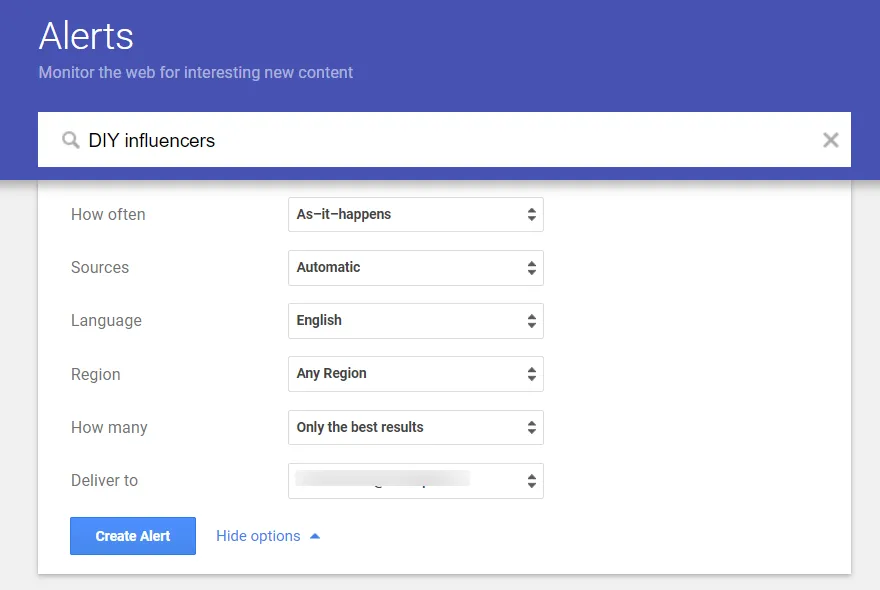
Look At Your Competitors’ Influencers
Looking at your competitors’ work can always save you a lot of time and research as well. So play smart and see what kinds of influencers your competitor brands are working with. You can make an approach to them with an offer of your own.
Social media influencers from a single niche can collaborate with competitor brands. That is if the campaigns are not run simultaneously.
However, this does not mean that you can pick up every influencer your peers work with. They have to be in sync with your brand values and image as well.
Working with Agencies
This is your best shot if you want to skip the hassle of doing the searching by yourself. A lot of influencers have become bigshots enough that they have employed agencies to make all their brand deals on their behalf.
So it could be a good idea to work with an influencer marketing agency to source suitable influencers to you. Of course this scenario would work if you have the budget to spare to hire said agency.
However, you would be able to save a ton of time and money and bypass all the hassle of finding, outreaching, and then negotiating with the influencers.
The Best Way-Influencer Marketing Software
This one would be the most tech-savvy way of answering your question of how to find an influencer for your brand. Influencer marketing tools facilitate your search to find the perfect influencer for your business.
You can use filters like niche, location, audience demographics, and engagement rate to sort through tons of influencer databases and find the right one for you. These tools provide you with all the means to contact the influencers including their social handles and email addresses.
Now that I’ve talked about what to look for and how to look for it, it’s time to come to the final stage of our influencer search. So let’s see how to make the first approach.
How to Get Influencers Onboard
So you have found an influencer who will be the perfect fit for your business. Now you have to take the initiative and get in touch with them.
Outreach
If an influencer has caught our eye, first and foremost, we DM them. This applies to platforms like LinkedIn and Instagram where we as a company use for influencer marketing.
Handy Tip: When making the first contact with the creator of your choice, make sure to praise their work. Talk about their recent work or show true appreciation to any particular post. This will give you a very good first impression.
With a perfunctory introduction and a good word about their work, reach out to them, showing your genuine interest in working with them. If they reply back to you, congrats, your outreach has been successful.
Now, our preference is to set up a video call rather than communicate by email. It enables both parties to get a better understanding of the intentions and objectives of each other.
Having done a number of outreach to influencers, we have gotten to know that no two influencers are the same. Some would take three to four calls to make the deal, while others would straightaway convey their decision after the initial meeting.
If the initial call goes well, ask them to send you their media kit. Every established digital creator has one. This kit has all the information about their past successful campaigns, the brands they have worked with, key metrics, content types they offer, and the charges for each combination.
And now it’s your turn to come up with an offer of your own.
You can sweeten the pot by offering a barter deal, i.e., offering them your product for free trials. However, thinking that you can employ the influencer in exchange of just your brand offerings and the exposure of your audience, you are at folly.
We have come to find out that this type of deal only works for certain products and niches like the fashion industry.
Most of the time, influencers would only be interested if actual payments were involved. And why not, given the fact that full-time influencers earn part of their livelihoods from these brand deals.
So, iron out these crucial details in the first place itself.
Create and Communicate a Transparent Brief
After both of the entities have come to an understanding, create an official agreement in which, the terms and conditions of the collaboration have been clearly stated.
Describe the number and posting frequency of all the creative assets promised by both participants. Do not deviate from any of the points that have been agreed upon.
Here are some of the clauses to be mentioned in the agreement:
- Scope of work: Define the specific deliverables (content types) and services the influencer is expected to provide.
- Timeline: Specify the duration of the collaboration as well as deadlines for content creation, review, and posting.
- Payment & compensation: Clearly state the compensation structure, outlining any additional costs the brand will cover (e.g., travel expenses, product costs).
- Content guidelines: Include brand messaging, key points, and any specific requirements (e.g., hashtags, mentions).
- Usage rights: Define how the brand can use the influencer’s content (e.g., reposting on the brand’s social media, website, advertisements) along with duration of the usage rights.
- Exclusivity: Specify whether the influencer is exclusive to the brand for a certain period
- Termination: Outline the conditions under which either party can terminate the agreement.
- Performance: Define KPIs or metrics that will be used to measure the success of the campaign.
- Confidentiality: Include a confidentiality clause to protect sensitive information shared during the collaboration.
It’s essential for both parties to review and agree upon each point before finalizing the agreement. If you are an agency acting on behalf of your client then this is one of the most important parts of your duty, to safeguard the best interest of your client.
Conclusion
Social media influencers are so much in demand, that people think they are the secret ingredient to the recipe for success online. But let me break the myth for you.
There is no magic, only smart strategizing.
It takes persistent efforts to attain sustainable results. If you are still at the questioning stage, asking how to find influencers for your brand it’s just the first step. The next part, the actual campaign, takes as much planning and effort, even more so.
Remember, authenticity and genuine connection should be at the forefront of your influencer marketing strategy. We can help you ask the right questions while searching to wean out the unsuitable options.
But the final decision to prioritize the right metrics has to be of your own. By doing so, you’ll not only find influencers but also forge partnerships that elevate your brand in the dynamic world of social media.
